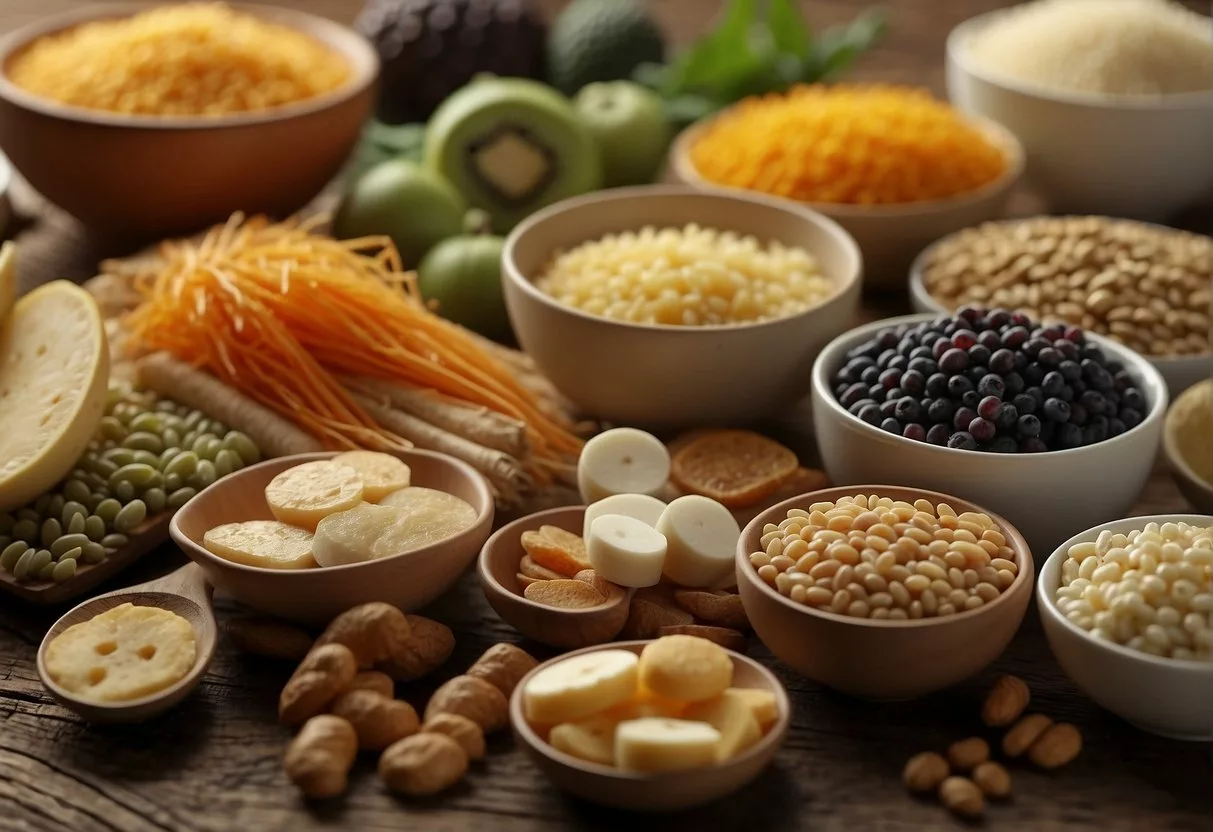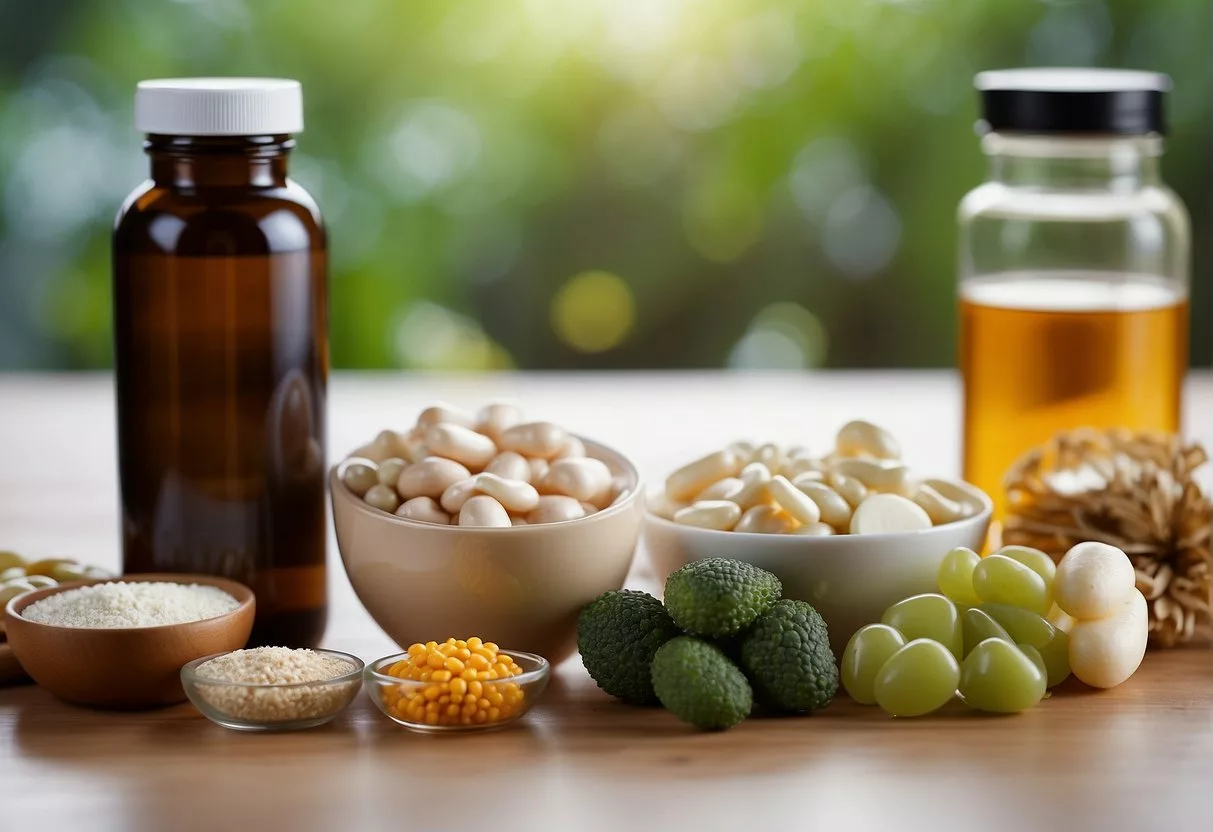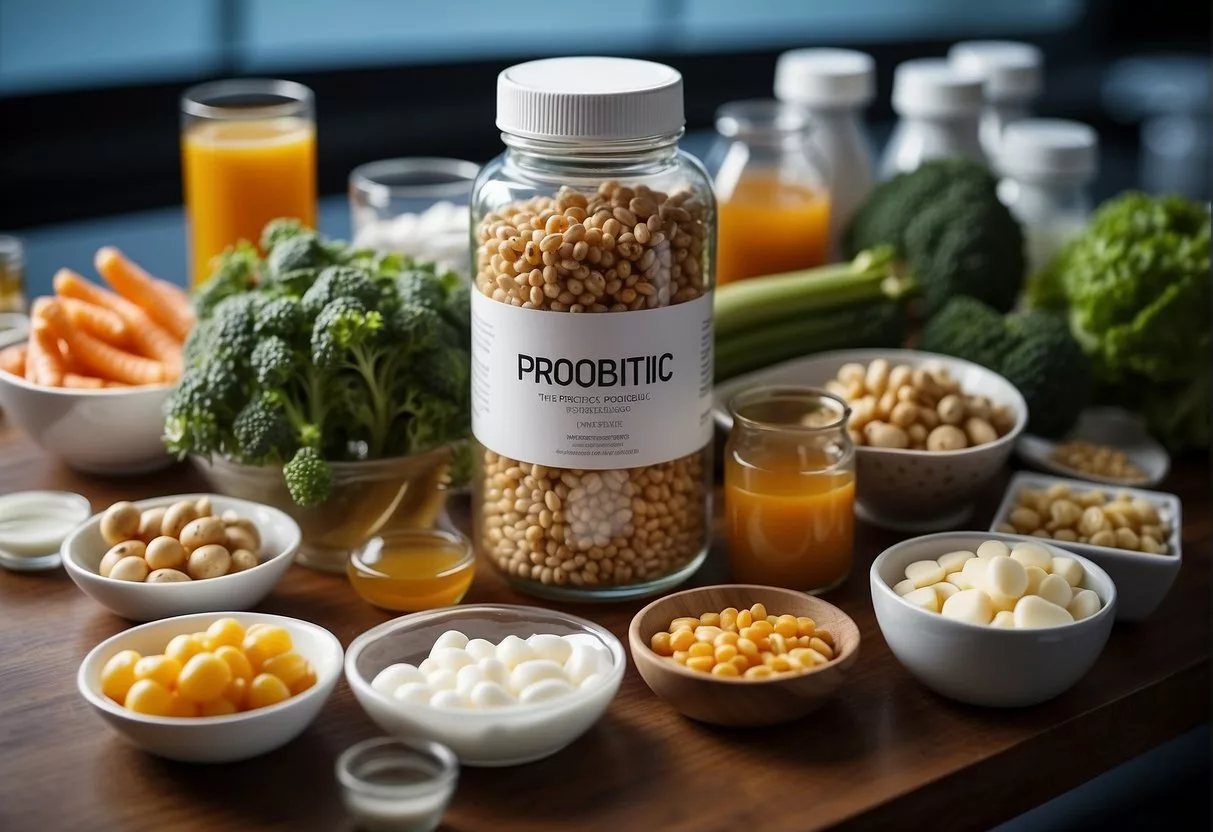The human gut is a complex ecosystem. A delicate balance of microorganisms plays a crucial role in our health and wellbeing.
Understanding the distinction between prebiotics and probiotics is fundamental to harnessing their benefits. Both contribute to the nourishment and maintenance of this system.
Prebiotics are dietary fibers that the human body cannot digest. They serve as food for probiotics, which are live beneficial bacteria. Together, they interact synergistically to support the gut microbiota. This influences not just digestive health but also the immune system and even mental health.

Probiotics are found in fermented foods like yogurt, kefir, sauerkraut, and kimchi, or can be consumed as dietary supplements. In contrast, prebiotics are present in foods such as bananas, onions, garlic, and whole grains.
While fiber-rich foods are widely recommended for a healthy diet, the specific role of prebiotics is to foster a healthy environment for probiotics to flourish.
In addition to diet, supplements can also play a role in providing these beneficial bacterias when the dietary intake is insufficient or specific health conditions necessitate their use.
The synergy between prebiotics and probiotics, sometimes referred to as synbiotics, is an area of active research with promising potential for promoting health and preventing disease.
Key Takeaways
- Prebiotics and probiotics are crucial for maintaining gut health, with distinct roles in the digestive ecosystem.
- Dietary sources provide both prebiotics and probiotics, but supplements can also be beneficial.
- The combination of prebiotics and probiotics, known as synbiotics, may offer enhanced health benefits.
Prebiotics vs Probiotics

Prebiotics and probiotics both play critical roles in supporting gut health, with distinct functions within the digestive system. They are essential for maintaining a balanced microbiome.
Defining Prebiotics and Probiotics
Prebiotics are types of dietary fiber that the human body does not digest. Instead, they serve as nourishment for beneficial bacteria—the probiotics—that inhabit the gastrointestinal tract.
Probiotics, on the other hand, are live microorganisms that, when consumed in adequate amounts, provide health benefits. They can be found in fermented foods or taken as supplements.
Historical Background
The concept of probiotics has roots in the early 20th century with the work of Elie Metchnikoff, who proposed that consuming beneficial bacteria could improve health.
Prebiotics, however, were identified much later. The term was coined in the 1990s to describe non-digestible food ingredients that stimulate the growth and activity of beneficial bacteria in the gut.
Key Differences
The key differences between prebiotics and probiotics can be summarized as follows:
- Nature: Prebiotics are fibers or compounds; probiotics are living organisms.
- Function: Prebiotics feed probiotics; probiotics contribute to gut flora balance.
- Sources: Prebiotics are found in foods such as whole grains, bananas, and onions. Probiotics are present in fermented foods like yogurt and sauerkraut.
Natural Sources of Prebiotics and Probiotics

Understanding the natural sources of prebiotics and probiotics is crucial for maintaining a balanced gut microbiome. Probiotics are beneficial bacteria that can be found in various fermented foods, while prebiotics are non-digestible fibers that act as food for these bacteria.
Common Probiotic Foods
Yogurt: A renowned source of probiotics, yogurt is made from fermented milk and often contains a variety of beneficial bacteria such as Lactobacillus and Bifidobacterium species.
Sauerkraut: This fermented cabbage dish is not just for topping sausages—it’s also a great source of probiotics that contribute to a healthy gut.
Kimchi: A staple in Korean cuisine, kimchi is made by fermenting vegetables with probiotic lactic acid bacteria, offering a tangy flavor and digestive benefits.
Kombucha: A fermented tea rich in probiotic cultures, kombucha has become popular for its purported health benefits.
Kefir: A drinkable form of fermented dairy, kefir is similar to yogurt but contains a broader range of probiotic bacteria and yeasts.
Pickles: The brined cucumbers known as pickles can provide probiotics, but only those that are naturally fermented; vinegar-based pickles do not have the same benefits.
Prebiotic-Rich Foods
Bananas, Onions, and Garlic: These everyday foods are not only versatile in the kitchen but also supply inulin, a type of prebiotic fiber.
Artichokes and Asparagus: Both of these vegetables are excellent sources of prebiotics, promoting the growth of beneficial gut bacteria.
Leeks and Chicory: Leeks share the prebiotic benefits of garlic and onions, while chicory is one of the best sources of inulin.
Jerusalem Artichoke: Not to be confused with the green globe artichokes, Jerusalem artichokes are tubers high in inulin, supporting probiotic growth and digestive health.
Health Benefits of Prebiotics and Probiotics

Prebiotics and probiotics play pivotal roles in maintaining health by supporting gut microbiome balance and function. These compounds interact directly with the body’s various systems, conferring a range of health benefits and addressing numerous conditions.
Enhancing Gut Health
Gut Bacteria: Prebiotics serve as fuel for beneficial gut bacteria, enhancing gut health by helping to maintain a balanced microbiome.
Probiotics introduce additional helpful bacteria into the digestive system. These can help restore the microbiome to a healthy state, thus supporting gastrointestinal health and reducing inflammation. According to Medical News Today, these beneficial microbes aid in digestion and play a role in the body’s overall health.
Supporting the Immune System
Immune System: A healthy gut microbiome supported by prebiotics and probiotics strengthens the immune system. This is because a large part of the body’s immune response is located in the gut.
The introduction of healthy bacteria from probiotics can combat harmful pathogens. It has also been associated with a reduced risk of certain infections.
Improving Digestive Disorders
- Irritable Bowel Syndrome (IBS): Probiotics are shown to alleviate symptoms of IBS, a common digestive disorder.
- Constipation: Prebiotic fibers can improve bowel regularity, potentially reducing the incidence of constipation.
Evidence from sources like Mayo Clinic suggests that prebiotics and probiotics may improve different aspects of digestive disorders by influencing the digestion process and gut health.
Potential in Obesity and Mental Health Management
Obesity: Research has linked gut microbiome composition to body weight and obesity. Prebiotics and probiotics influence metabolism and potentially play a role in weight management.
Mental Health: Emerging studies hint at a connection between gut health and mental health. Probiotics could offer benefits for mood and cognitive functions due to the gut-brain axis. Balancing gut bacteria with prebiotics and probiotics could be a promising avenue for managing certain mental health issues.
The Role of Fiber in Prebiotic Functions

Prebiotic functions are heavily influenced by dietary fiber, which serves as the principal fuel for beneficial gut bacteria.
Types of Dietary Fiber
Dietary fiber, essential for a healthy diet, can be categorized into two main types: soluble and insoluble.
Soluble fiber, found in foods like oats, nuts, beans, and legumes, dissolves in water to form a gel-like substance. Meanwhile, insoluble fiber, present in whole grains and vegetables, does not dissolve in water.
Both types of fiber contribute to the overall health of the digestive system but play different roles in prebiotic activities.
Probiotic Supplements and Their Use

In the landscape of dietary supplements, probiotic supplements play a significant role in promoting gut health by supplying beneficial bacteria. They are used to enhance the gut microbiota and can have various health benefits when chosen and used correctly.
Choosing the Right Probiotic Supplement
When selecting a probiotic supplement, it’s crucial to consider the strains of bacteria it contains, as certain strains have been associated with specific health benefits.
Lactobacillus and Bifidobacterium are two common genera found in high-quality supplements. A supplement should specify the genus, species, and strain to inform consumers about the particular type of bacteria it includes. It is also important to look for the colony-forming units (CFUs), which indicate the number of viable bacteria in each dose.
Potential Side Effects and Safety
Probiotic supplements are generally considered safe for most people, but they can cause side effects, especially during the first few days of use.
Common side effects include minor digestive symptoms such as gas and bloating. However, in immunocompromised individuals, there is a risk of infections, and such side effects should be taken seriously. Any adverse symptoms should prompt consultation with a healthcare professional.
The Role of Healthcare Professionals
Healthcare professionals play an essential role in guiding the appropriate use of probiotic supplements.
They can assess a patient’s health status, recommend specific probiotic strains that may be beneficial, and provide advice on suitable dosages. Furthermore, doctors can monitor for side effects and ensure the safety of probiotic use in conjunction with other treatments, especially in those with underlying health conditions.
Synergistic Effects of Synbiotics

Synbiotics are a combination of probiotics and prebiotics, formulated to improve the survival and activity of beneficial microorganisms in the gut. Prebiotics are non-digestible fibers that serve as food for probiotics, the live beneficial bacteria.
A key benefit of synbiotics is their ability to enhance the survival rate of probiotics as they travel through the gastrointestinal tract.
Prebiotics in synbiotic supplements act as a fuel source, supporting probiotic growth and activity, leading to improved colonization in the intestines.
- Probiotic Strains: Lactobacillus, Bifidobacterium
- Common Prebiotics: Inulin, Fructooligosaccharides (FOS)
Fermented foods, like yogurt and kefir, naturally contain both probiotics and prebiotics. However, synbiotic products are specifically designed to have a synergistic effect. This strategic pairing ensures that the prebiotic components selectively nourish the probiotic strains present, optimizing gut health benefits.
- Fermented Foods as Synbiotics: Sauerkraut, Kimchi
The synergy in synbiotics is based on the principle that prebiotics can enhance the probiotic’s resilience, potentially leading to improved immune function and intestinal health. Research has indicated that these combinations may modulate the gut microbiota more effectively than when either is used alone.
Prebiotics, Probiotics and Dietary Recommendations

Understanding the balance and intake of prebiotics and probiotics is crucial for maintaining a healthy gut microbiome. Dietary recommendations often focus on integrating both through a variety of food sources and, when necessary, dietary supplements.
Recommended Intake and Ratios
Prebiotics are typically dietary fibers found naturally in many plant-based foods. They are not digested by the human body but instead serve as nourishment for probiotics—the beneficial bacteria in the gut.
Dietary guidelines do not specify an exact daily amount of prebiotics, but a diet rich in fruits, vegetables, and whole grains will typically provide an adequate supply.
Probiotics, on the other hand, are live microorganisms that can confer health benefits when consumed in appropriate quantities.
The recommended daily intake for probiotics is not universally established, as it can vary based on the specific strains and the desired health outcome. However, it is generally advised to consume probiotic-rich foods like yogurt and kefir regularly.
Incorporating into the Diet
To include prebiotics in one’s diet, a person could focus on:
- Whole grains such as barley and oats
- Vegetables such as garlic, onion, and asparagus
- Fruits like bananas and apples
For probiotics, commonly recognized food sources are:
- Fermented dairy products like yogurt and kefir
- Non-dairy options such as sauerkraut, kimchi, and miso
Combining these foods into daily meals ensures a constant influx of both prebiotics and probiotics to support gut health.
Advice from Dietitians and Nutritionists
Dietitians and nutritionists often emphasize eating a variety of foods to get a spectrum of prebiotics and probiotics.
They may recommend starting with natural food sources and considering dietary supplements if specific probiotic strains are needed or for individuals with particular health concerns. They also stress that while both prebiotics and probiotics are important for health, they should be introduced gradually to the diet to prevent any gastro-intestinal discomfort.
The Impact of Prebiotics and Probiotics on Specific Health Conditions

Investigating the influence of prebiotics and probiotics on health reveals their pivotal role in managing certain conditions. They play crucial roles in the modulation of gut flora, enhancing immune function, and optimizing neonatal and pediatric health.
Gut Flora and Antibiotics
Antibiotics are known to disrupt the balance of gut flora by eradicating both harmful and beneficial bacteria.
The introduction of probiotics can replenish beneficial bacteria, potentially mitigating the negative impacts of antibiotic use. For instance, studies suggest that probiotics can reduce the incidence of Clostridium difficile infections, which are a common complication of antibiotic therapy.
Immune Function and Allergies
Probiotics and prebiotics may enhance immune function, potentially reducing the severity of allergies.
Research indicates that certain strains of probiotics can modulate the immune system, possibly alleviating symptoms associated with allergic reactions. Regular consumption of these beneficial microbes may provide a protective effect and support overall immune health.
Neonatal and Pediatric Health
The health of newborns and children may be significantly influenced by the early establishment of a balanced gut microbiota.
Breast milk, naturally rich in prebiotics, supports the development of a healthy gut environment. When breastfeeding is not possible, infant formula fortified with prebiotics and probiotics can be a beneficial alternative, potentially reducing the risk of conditions like necrotizing enterocolitis in premature infants.
Emerging Research and Future Directions

Recent advances in the understanding of the human microbiome highlight potential for innovative and effective treatments in the field of gut health, as well as demonstrating connections between gut microbiota and brain function. The following subsections explore specific avenues of current research and anticipated developments in microbiome therapy and neurogastroenterology.
Microbiome Therapy
Microbiome therapy is on the brink of transforming traditional medical approaches with its uniquely tailored application to individual gut flora.
Researchers are exploring how manipulating the microbial composition can treat conditions associated with dysbiosis. An intervention that has gained attention is fecal microbiota transplantation (FMT), which has shown efficacy in treating conditions like Clostridioides difficile infection and is being researched for various other conditions associated with gut microbiota imbalance.
- Conditions Under Study:
- Inflammatory Bowel Disease (IBD)
- Irritable Bowel Syndrome (IBS)
- Metabolic disorders, such as obesity and type 2 diabetes
The field is evolving, with ongoing research exploring the development of defined microbial consortia as an alternative to FMT, focused on the safety and efficacy of these complex biologic products.
Prebiotics, Probiotics and the Brain
There is an emerging body of research surrounding the gut-brain axis, which posits a bidirectional communication network that not only ensures the proper maintenance of gastrointestinal homeostasis but is also likely to have multiple effects on affect, motivation, and higher cognitive functions, including intuition.
Through this lens, both prebiotics and probiotics are being scrutinized for their potential roles in modulating brain function, especially regarding mental health disorders like depression.
- Potential Impacts:
- Modulation of Stress Responses: Influencing the hypothalamic-pituitary-adrenal axis.
- Neurotransmitter Production: Involvement in the synthesis of mood-related neurotransmitters like serotonin.
Preliminary studies suggest that certain probiotics, often referred to as “psychobiotics,” may have the potential to alleviate symptoms of depression by influencing the gut microbiota. This research paves the way for novel prebiotic and probiotic applications in the prevention and treatment of psychiatric conditions, underlining the necessity for rigorous clinical trials to validate these findings.
Regulatory and Quality Concerns

When dealing with probiotics and prebiotics, it is crucial to consider the regulatory frameworks and quality control measures that govern their safety and efficacy.
FDA Regulations on Supplements
The Food and Drug Administration (FDA) plays a critical role in the oversight of dietary supplements, including probiotics and prebiotics.
As dietary supplements, these products are not required to undergo the rigorous pre-market approval process that is mandatory for pharmaceuticals. However, manufacturers are responsible for ensuring the safety of their products and for making claims that are truthful and not misleading.
The FDA requires proper labeling and prohibits the marketing of products that are adulterated or misbranded.
- Labeling Requirements: The FDA mandates that supplement labels provide accurate information about the product. This includes the identity of the product, the net quantity of the contents, the ingredient list, the name and place of business of the manufacturer, packer, or distributor, and directions for use.
- Adverse Event Reporting: Manufacturers, packers, and distributors of dietary supplements must report any serious adverse events to the FDA within 15 business days.
Quality and Source Verification
For consumers and healthcare providers, the quality and source of probiotics and prebiotics are of paramount importance. These aspects directly impact the safety and potential health benefits of the products.
- Product Quality: Verification of product quality involves assessing several factors, including potency, purity, and the presence of viable bacteria in probiotics. The specific strains should be identified, and their health effects documented.
- Source Verification: Understanding the source of the probiotic or prebiotic is essential. It includes evaluating the origin of the strains and the manufacturing practices used to produce the supplement. Poor manufacturing practices can lead to products that are contaminated or contain incorrect strains.
Companies can undergo third-party testing and obtain certifications to demonstrate their commitment to quality. Consumers can look for these certifications on product packaging as an indicator of a product’s reliability.
Frequently Asked Questions

In considering the roles of prebiotics and probiotics, they address a shared goal: promoting gut health. Each has distinct functions and potential benefits, and understanding their differences, synergies, and individual impacts on well-being can help individuals make informed decisions about their dietary choices and supplement use.
What are the benefits of taking both prebiotics and probiotics?
Taking both prebiotics and probiotics can enhance gut microbiota health. Prebiotics ensure that beneficial bacteria (probiotics) are well-fed and able to proliferate due to the non-digestible fibers they consume.
Which is more effective for weight management: prebiotics or probiotics?
For weight management, both prebiotics and probiotics could play a role Healthgrades. Probiotics may help modulate the gut microbiota in a way that supports a healthy weight, while prebiotics may contribute by maintaining gut health and regulating satiety.
What are the best foods to eat for a good prebiotic and probiotic balance?
Foods rich in probiotics like yogurt and sauerkraut, and those high in prebiotic fibers, such as whole grains, bananas, and artichokes, can promote a healthy balance in the gut microbiota. The Mayo Clinic suggests inclusion of these foods in one’s diet for optimal gut health.
How can prebiotics and probiotics affect digestive health?
Prebiotics and probiotics contribute to digestive health by influencing the diversity and functionality of the gut microbiome. Prebiotics serve as food to beneficial bacteria, while probiotics are those bacteria that help maintain a healthy digestive environment.
Who may benefit from taking prebiotic supplements?
Individuals experiencing dietary deficiencies in fiber or those with imbalanced gut microbiota may benefit from taking prebiotic supplements. This could include people with digestive issues or those on specific diets that limit intake of prebiotic-rich foods.
Are there any risks associated with taking prebiotics for certain individuals?
For some people, taking prebiotics could exacerbate symptoms. This is especially true for those with FODMAP (fermentable oligosaccharides, disaccharides, monosaccharides and polyols) sensitivities or intestinal issues like small intestinal bacterial overgrowth (SIBO). They should exercise caution and consult healthcare providers before taking prebiotic supplements.